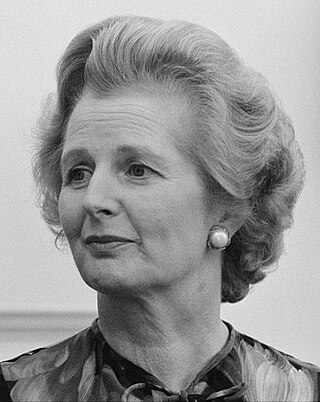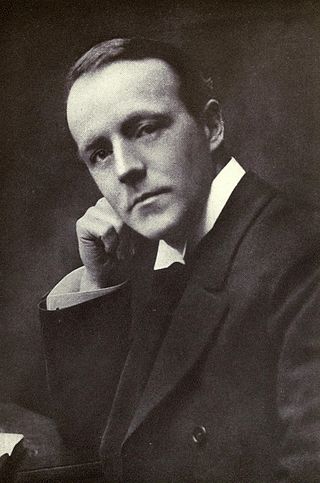
Margaret Hilda Thatcher, Baroness Thatcher, was a British stateswoman and Conservative politician who was Prime Minister of the United Kingdom from 1979 to 1990 and Leader of the Conservative Party from 1975 to 1990. She was the longest-serving British prime minister of the 20th century and the first woman to hold the position. As prime minister, she implemented economic policies known as Thatcherism. A Soviet journalist dubbed her the "Iron Lady", a nickname that became associated with her uncompromising politics and leadership style.

Roy Harris Jenkins, Baron Jenkins of Hillhead, was a British politician and writer who served as the sixth president of the European Commission from 1977 to 1981. At various times a Member of Parliament (MP) for the Labour Party, Social Democratic Party (SDP), and the Liberal Democrats, he was Chancellor of the Exchequer and Home Secretary under the Wilson and Callaghan Governments.

The 1979 United Kingdom general election was held on Thursday 3 May 1979 to elect 635 members to the House of Commons. The election was held following the defeat of the Labour government in a no-confidence motion on 28 March 1979, six months before the Parliament was due for dissolution in October 1979.

Thatcherism is a form of British conservative ideology named after Conservative Party leader Margaret Thatcher that relates to not just her political platform and particular policies but also her personal character and style of management while in office. Proponents of Thatcherism are referred to as Thatcherites. The term has been used to describe the principles of the British government under Thatcher from the 1979 general election to her resignation in 1990. In international terms, Thatcherites have been described as a part of the general socio-economic movement known as neoliberalism, with different countries besides the United Kingdom sharing similar policies around expansionary capitalism.

Bevanism was a movement on the left wing of the Labour Party in the late 1950s led by Aneurin Bevan which also included Richard Crossman, Michael Foot and Barbara Castle. Bevanism was opposed by the Gaitskellites, moderate social democrats within the party. The Gaitskellites typically won most of the battles inside Parliament, but Bevanism was stronger among local Labour activists. The Bevanites split over the issue of nuclear weapons, and the movement faded away after Bevan died in 1960.

Sir Denis Thatcher, 1st Baronet, was an English businessman and the husband of Margaret Thatcher, who served as the first female British prime minister from 1979 to 1990; thus he became the first male prime ministerial spouse.

Carol Jane Thatcher is an English journalist, author and media personality. She is the daughter of Margaret Thatcher, the British prime minister from 1979 to 1990, and businessman Denis Thatcher.
Hugo John Smelter Young was a British journalist and columnist and senior political commentator at The Guardian.

Walter Runciman, 1st Viscount Runciman of Doxford,, was a prominent Liberal and later National Liberal politician in the United Kingdom. His 1938 diplomatic mission to Czechoslovakia was key to the enactment of the British policy of appeasement of Nazi Germany preceding the Second World War.

Lady Dorothy Evelyn Macmillan was an English socialite and the third daughter of Victor Cavendish, 9th Duke of Devonshire, and Evelyn Cavendish, Duchess of Devonshire. She was married to Harold Macmillan from 1920 until her death.

The Members' Lobby is a hallway in the Palace of Westminster used by members of the House of Commons, the lower house of the Parliament of the United Kingdom. Members of Parliament may congregate here for discussions while not dealing with other business.

The Liberal government of the United Kingdom of Great Britain and Ireland that began in 1905 and ended in 1915 consisted of two ministries: the first led by Henry Campbell-Bannerman and the final three by H. H. Asquith.
Prime Minister parodies are a long-running feature of the British satirical magazine Private Eye, which have been included in the majority of issues since the magazine's inception. The parodies consist of one arch satirical personification of the Prime Minister of the United Kingdom of the day, and use that personification to send up continuously that Prime Minister's personality and style of leadership, and the personalities and general features of his or her cabinet. Such are their popularity that the parodies usually find their way into mainstream culture far beyond simply being viewed as a joke within the pages of Private Eye, and are subsequently mentioned often in other journalistic appraisals of the individual in question.
The 1920 Paisley by-election was a parliamentary by-election held on 12 February 1920 for the House of Commons constituency of Paisley in Scotland. It was caused by the death of the constituency's sitting Liberal Member of Parliament Sir John Mills McCallum. Former Prime Minister H.H. Asquith, who was still leader of the Liberal Party but who had lost his seat at the 1918 general election, returned to the Commons.

The Iron Lady is a 2011 biographical drama film based on the life and career of Margaret Thatcher, a British politician who was the longest-serving Prime Minister of the United Kingdom of the 20th century and the first woman to hold the office. The film was directed by Phyllida Lloyd and written by Abi Morgan. Thatcher is portrayed primarily by Meryl Streep, and, in her formative and early political years, by Alexandra Roach. Thatcher's husband, Denis Thatcher, is portrayed by Jim Broadbent and by Harry Lloyd as the younger Denis. Thatcher's longest-serving cabinet member and eventual deputy, Geoffrey Howe, is portrayed by Anthony Head.
The Speaker's Lectures were series of lectures initiated by John Bercow, the Speaker of the House of Commons, from 2011 to 2019. To mark the centenary of the Parliament Act 1911, Bercow commissioned a series of 11 lectures throughout 2011 covering some of the main political figures of the century. Each lecture was given to an invited audience in Speaker's House and was recorded for broadcast on BBC Parliament. In 2012 Bercow instituted a new 11 lecture series on the subject of the 'Great Offices of State'. In 2013 the lectures were on the subject of 'Parliaments and Parliamentarians', given by leading Parliamentarians who have experience of other legislatures. The 2014 series concentrated on 'Parliamentarians on Public Policy'. In 2015 and 2016, Bercow instituted the theme of 'Parliamentarians on Parliamentarians', based on prominent Parliamentarians throughout history. The 2017 series focused on 'The Future of...' various political topics, such as the Press, Armed Forces, or Brexit. The penultimate 2018 series was divided into two parts, with the first being 'Brexit and beyond, Britain's place in the world in the 2020s', and the second 'Women and British Politics, where next?'. The 2019 series carried the theme 'What if?', discussing hypothetical political scenarios from recent history. This series was cut short as Bercow's status and role in Brexit became elevated. There is no plan for the series to continue under the following Speaker, Lindsay Hoyle.
This bibliography includes major books and articles about British prime minister Margaret Thatcher and her policies in office.

The Castlereagh–Canning duel was a pistol duel between the British Minister of War Viscount Castlereagh and Foreign Secretary George Canning, which took place on September 21, 1809, at Putney Heath. The reasons for the duel were the rivalry between the two politicians and numerous disagreements between them over the conduct of the war against Napoleonic France in 1808 and 1809. These differing opinions ultimately led to Canning's demand for a new appointment to the War Office in the spring of 1809, accompanied by a threat of his own resignation. Prime Minister Portland was reluctant to lose either Canning or Castlereagh and delayed a decision for an extended period. Instead, the matter was discussed with King George III and other members of the cabinet without Castlereagh's knowledge. Castlereagh was not immediately informed of the circumstances. He only became aware of the discussions in the late summer of 1809 and, in response, challenged Canning to a duel a few days later.












